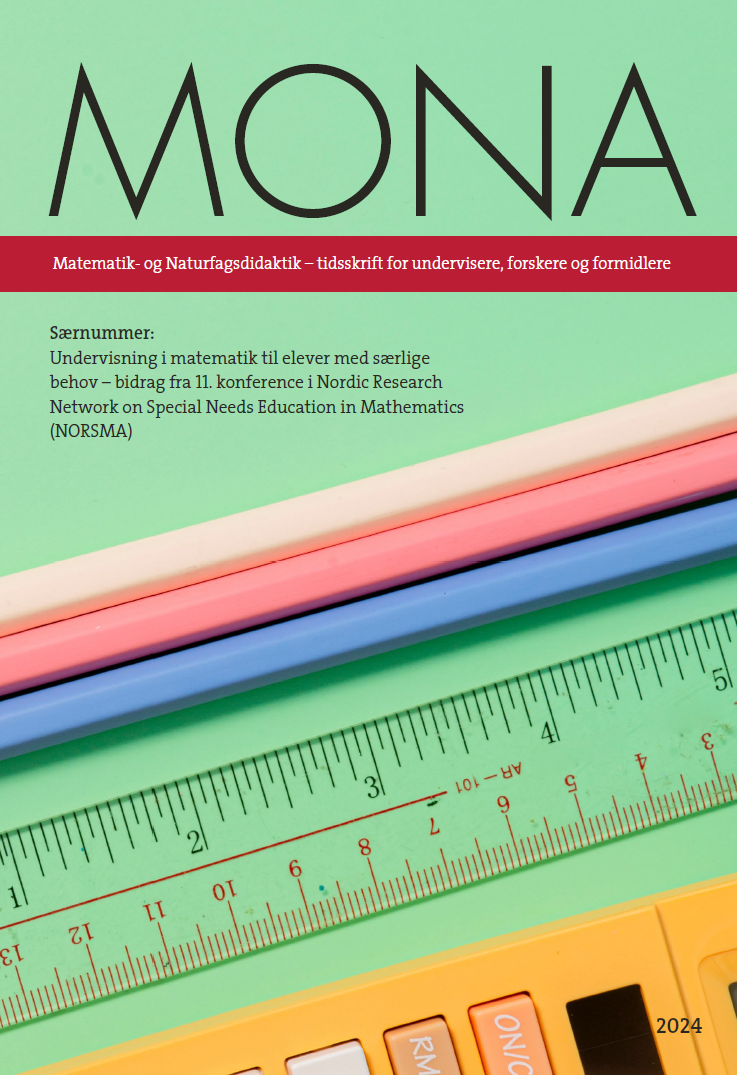Resumé
Dette studie undersøger lavt præsterende elevers strategier for regning med flercifrede tal sammenlignet med højere præsterende elever. Lavt præsterende elever defineres som de elever, der er blandt de 35 % lavest scorende i nationale tests i matematik. Data om 685 danske 6.-klasseelevers brug af talbaserede strategier og standardalgoritmer i flercifret addition, subtraktion og multiplikation blev sammenlignet mellem de fem præstationsgrupper i nationale tests. Resultaterne viste en stigende brug af talbaserede strategier for hvert præstationsniveau, men ingen signifikante forskelle mellem præstationsgrupper i brug af standardalgoritme. Talbaserede strategier resulterede oftere i korrekt resultat end standardalgoritmen for alle præstationsgrupper undtagen de 10 % lavest scorende.
Referencer
Aunio, P. & Niemivirta, M. (2010). Predicting Children’s Mathematical Performance in Grade One by Early Numeracy. Learning and Individual Differences, 20(5), 427‑435. https://doi.org/10.1016/j.lindif.2010.06.003
Børne- og Undervisningsministeriet. (2017). Vejledning om de nationale tests – til skoleledere.Børne- og Undervisningsministeriet.
Børne- og Undervisningsministeriet. (2019). Matematik – læseplan. https://emu.dk/sites/default/ files/2020‑09/GSK_L%C3%A6seplan_Matematik.pdf
Børne- og Undervisningsministeriet. (u.å) Testresultater. Lokaliseret 21/6‑2024 fra https://uddannelsesstatistik. dk/Pages/Topics/17.aspx?excel=1579
Geary, D. C., Hamson, C. O. & Hoard, M. K. (2000). Numerical and Arithmetical Cognition: A Longitudinal Study of Process and Concept Deficits in Children With Learning Disability. Journal of Experimental Child Psychology, 77(3), 236‑263. https://doi.org/10.1006/jecp.2000.2561
Hickendorff, M. (2018). Dutch Sixth Graders’ Use of Shortcut Strategies in Solving Multidigit Arithmetic Problems. European Journal of Psychology of Education, 33(4), 577‑594. https://doi.org/10.1007/s10212‑017‑0357‑6
Hickendorff, M., Torbeyns, J. & Verschaffel, L. (2019). Multi-Digit Addition, Subtraction, Multiplication, and Division Strategies. I A. Fritz, V. G. Haase & P. Räsänen (red.), International Handbook of Mathematical Learning Difficulties (s. 543‑560). Springer. https://doi.org/10.1007/978‑3‑319‑97148‑3_32
Jóelsdóttir, L. B. (2023). Essays on Adaptivity and Flexibility in Multidigit Arithmetic. Ph.d.-afhandling. Institut for Økonomi, Aarhus Universitet.
Jóelsdóttir, L. B. & Andrews, P. (2023). Danish Third, Sixth and Eighth Grade Students’ Strategy Adaptivity, Strategy Flexibility and Accuracy When Solving Multidigit Arithmetic Tasks. European Journal of Psychology of Education. https://doi.org/10.1007/s10212‑023‑00786‑2
Jóelsdóttir, L. B. & Andrews, P. (2024). Grade Six Students’ Multi-Digit Arithmetic Strategy Adaptivity and Flexibility: Evaluating a Novel Tri-Phase Assessment Tool. International Journal of Mathematical Education in Science and Technology. https://doi.org/10.1080/002 0739X.2024.2328341
Jóelsdóttir, L. B. & Sunde, P. (2024). Adaptivitet og fleksibilitet – addition og subtraktion med flercifrede tal. [Manuskript accepteret til udgivelse i MONA].
MacDonald, B., Westenskow, A., Moyer-Packenham, P. S. & Child, B. (2018). Components of Place Value Understanding: Targeting Mathematical Difficulties When Providing Interventions. School Science and Mathematics, 118(1/2), 17‑29. https://doi.org/10.1111/ssm.12258
McMullen, J., Brezovszky, B., Rodríguez-Aflecht, G., Pongsakdi, N., Hannula-Sormunen, M. M. & Lehtinen, E. (2016). Adaptive Number Knowledge: Exploring the Foundations of Adaptivity With Whole-Number Arithmetic. Learning and Individual Differences, 47, 172‑181. https://doi.org/10.1016/j.lindif.2016.02.007
Ostad, S. (1999). Developmental Progression of Subtraction Strategies: A Comparison of Mathematically Normal and Mathematically Disabled Children. European Journal of Special Needs Education, 14(1), 21‑36. https://doi.org/10.1080/0885625990140103
Peltenburg, M., van den Heuvel-Panhuizen, M. & Robitzsch, A. (2012). Special Education Students’ Use of Indirect Addition in Solving Subtraction Problems up to 100: A Proof of the Didactical Potential of an Ignored Procedure. Educational Studies in Mathematics, 79, 351‑369. https://doi.org/10.1007/s10649‑011‑9351‑0
Rittle-Johnson, B. & Schneider, M. (2015). Developing Conceptual and Procedural Knowledge of Mathematics. I R. C. Kadosh & A. Dowker (red.), The Oxford Handbook of Numerical Cognition (s. 1118‑1134). Oxford University Press. https://doi.org/10.1093/oxfordhb/9780199642342.013.014
Rittle-Johnson, B., Star, J. R. & Durkin, K. (2012). Developing Procedural Flexibility: Are Novices Prepared to Learn From Comparing Procedures? British Journal of Educational Psychology, 82(3), 436‑455. https://doi.org/10.1111/j.2044‑8279.2011.02037.x
Sunde, P. B., De Smedt, B., Verschaffel, L. & Sunde, P. (2023). Grade One Single-Digit Addition Strategies as Predictors of Grade Four Achievement in Mathematics. European Journal of Psychology of Education. https://doi.org/10.1007/s10212‑023‑00761-x
Torbeyns, J., Peters, G., De Smedt, B., Ghesquière, P. & Verschaffel, L. (2018). Subtraction by Addition Strategy Use in Children of Varying Mathematical Achievement Level: A Choice/No-Choice Study. Journal of Numerical Cognition, 4(1), 215‑234. https://doi.org/10.5964/jnc.v4i1.77
Undervisningsministeriet. (2001). Klare mål – matematik – faghæfte 12. Undervisningsministeriet.
Van Der Auwera, S., Torbeyns, J., De Smedt, B., Verguts, G. & Verschaffel, L. (2022). The Remarkably Frequent, Efficient, and Adaptive Use of the Subtraction by Addition Strategy: A Choice/No-Choice Study in Fourth- to Sixth-Graders With Varying Mathematical Achievement Levels. Learning and Individual Differences, 93, 102107. https://doi.org/10.1016/j.lindif.2021.102107
Verschaffel, L., Luwel, K., Torbeyns, J. & Van Dooren, W. (2009). Conceptualizing, Investigating, and Enhancing Adaptive Expertise in Elementary Mathematics Education. European Journal of Psychology of Education, 14(3), 335‑359. https://doi.org/10.1007/BF03174765
Verschaffel, L., Torbeyns, J., De Smedt, B., Luwel, K. & Van Dooren, W. (2007). Strategy Flexibility in Children With low Achievement in Mathematics. Educational & Child Psychology, 24(2), 16‑27.
Xu, L., Liu, R. D., Star, J. R., Wang, J., Liu, Y. & Zhen, R. (2017). Measures of Potential Flexibility and Practical Flexibility in Equation Solving. Frontiers in Psychology, 8, 1368. https://doi.org/10.3389/fpsyg.2017.01368
Yackel, E. & Cobb, P. (1992). Sociomathematical Norms, Argumentation, and Autonomy in Mathematics. Journal for Research in Mathematics Education, 27(4), 458‑477. https://doi. org/10.5951/jresematheduc.27.4.0458

